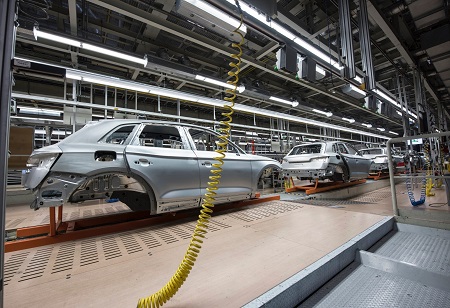
Decentralized manufacturing will enable companies to create more personalized products, reduce waste, and use fewer resources. It also increases product availability, as products can be produced closer to the end user. Lastly, it reduces reliance on large, centralized production hubs, making the supply chain more resilient. Decentralized manufacturing can also help to create more jobs in local economies, and can reduce environmental impacts, such as carbon emissions. This can result in increased efficiency and cost savings for companies and better options for consumers. Companies can also benefit from the ability to customize products for individual customers, as well as the potential for lower transportation costs. Furthermore, decentralized manufacturing can result in shorter lead times and faster delivery of products. This has the potential to revolutionize the manufacturing industry and create a more sustainable global economy. This could lead to a shift away from traditional mass production towards personalized and locally produced goods, allowing for increased customization, shorter lead times and faster delivery. This could ultimately result in increased customer satisfaction and improved financial performance for companies. This would also have a positive environmental impact, as less energy and resources would be consumed in the production process. Finally, it would reduce our reliance on overseas production, helping to support the local economy.
Let us explore how decentralized manufacturing can solve mass production in the following sections-
Region-specific customization
It eliminates the need for expensive infrastructure, as decentralized production can be done with existing technology. Additionally, it reduces mass production's environmental impact by using local resources. Decentralized production also allows for greater customization of products, as they can be made to order at the local level. Furthermore, it offers increased flexibility, allowing for faster adaptation to changes in the market. This allows businesses to focus on creating value and responding quickly to customer needs, instead of spending money and time on costly production processes. This in turn allows businesses to produce goods and services more efficiently and cost-effectively. For instance, many clothing retailers have shifted to a decentralized production model, allowing them to produce garments quickly and to a customer's exact specifications.
Reduced transportation costs
This makes it more cost effective and efficient for businesses to get their products to the market. Additionally, it enables businesses to be more agile and responsive to customer demands. Finally, this increased flexibility can help businesses become more competitive in the market. This helps to reduce costs and improve customer satisfaction, leading to increased profits and market share. This increased flexibility also allows businesses to quickly adjust to changes in the market and respond to new trends. This can help businesses stay ahead of their competitors and maintain their competitive advantage. In addition, by being flexible and agile, businesses can create new products and services that can give them a competitive edge. This can lead to higher profits and market share in the long-term. For example, the ability to quickly adjust production levels to meet customer demand could allow a business to take advantage of a surge in orders and increase their profits.
Opportunities for local jobs
It allows businesses to create more local jobs, which can boost the local economy and foster a sense of community. This can help businesses gain goodwill from the local community and build loyal customers. It also helps businesses to better understand the needs and interests of the local community, which in turn can help them to create products and services that better meet those needs. Additionally, local businesses can contribute to the community through charitable giving and social initiatives. This can result in increased profits and a higher level of customer satisfaction. It also serves as a form of marketing, as customers are more likely to support businesses that are actively involved in the community. By engaging in local charitable initiatives, businesses can demonstrate their commitment to the community and create a positive reputation. This helps to differentiate them from their competitors and can lead to increased loyalty and brand recognition, which can ultimately result in increased profits. For instance, a local grocery store in the community may partner with a food bank to donate its surplus food at the end of each day to help support those in need.
Companies can adopt decentralized manufacturing to increase scalability, reduce costs, and streamline operations. With decentralized manufacturing, companies can build smaller, more efficient production systems that are tailored to their specific needs. This will enable companies to better serve their customers and increase their profit margins. Decentralized manufacturing can also make it easier for companies to respond quickly to changes in the market and increase their agility. Furthuremore, it can reduce the risk of disruption caused by supply chain issues. For instance, a company that manufactures custom-made products can use a decentralized manufacturing system to quickly adjust production for new orders, allowing them to quickly respond to customer needs and maintain their competitive edge.

